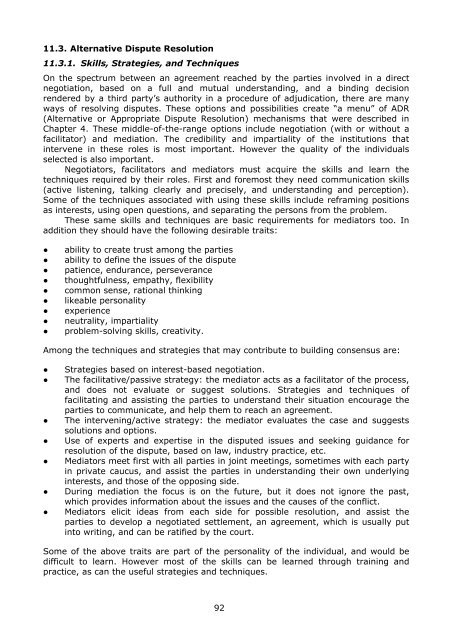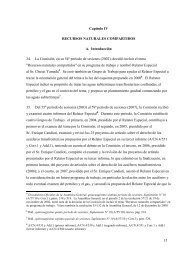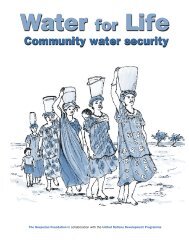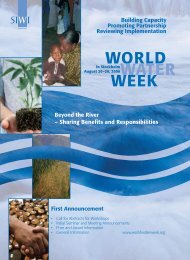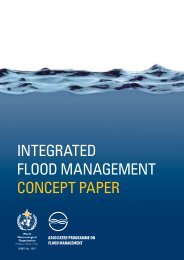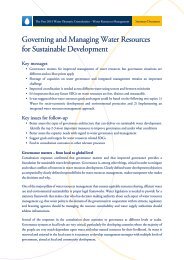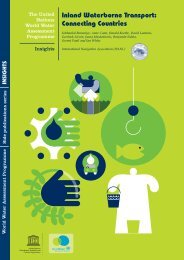Water security and peace: a synthesis of studies ... - unesdoc - Unesco
Water security and peace: a synthesis of studies ... - unesdoc - Unesco
Water security and peace: a synthesis of studies ... - unesdoc - Unesco
Create successful ePaper yourself
Turn your PDF publications into a flip-book with our unique Google optimized e-Paper software.
11.3. Alternative Dispute Resolution<br />
11.3.1. Skills, Strategies, <strong>and</strong> Techniques<br />
On the spectrum between an agreement reached by the parties involved in a direct<br />
negotiation, based on a full <strong>and</strong> mutual underst<strong>and</strong>ing, <strong>and</strong> a binding decision<br />
rendered by a third party’s authority in a procedure <strong>of</strong> adjudication, there are many<br />
ways <strong>of</strong> resolving disputes. These options <strong>and</strong> possibilities create “a menu” <strong>of</strong> ADR<br />
(Alternative or Appropriate Dispute Resolution) mechanisms that were described in<br />
Chapter 4. These middle-<strong>of</strong>-the-range options include negotiation (with or without a<br />
facilitator) <strong>and</strong> mediation. The credibility <strong>and</strong> impartiality <strong>of</strong> the institutions that<br />
intervene in these roles is most important. However the quality <strong>of</strong> the individuals<br />
selected is also important.<br />
Negotiators, facilitators <strong>and</strong> mediators must acquire the skills <strong>and</strong> learn the<br />
techniques required by their roles. First <strong>and</strong> foremost they need communication skills<br />
(active listening, talking clearly <strong>and</strong> precisely, <strong>and</strong> underst<strong>and</strong>ing <strong>and</strong> perception).<br />
Some <strong>of</strong> the techniques associated with using these skills include reframing positions<br />
as interests, using open questions, <strong>and</strong> separating the persons from the problem.<br />
These same skills <strong>and</strong> techniques are basic requirements for mediators too. In<br />
addition they should have the following desirable traits:<br />
! ability to create trust among the parties<br />
! ability to define the issues <strong>of</strong> the dispute<br />
! patience, endurance, perseverance<br />
! thoughtfulness, empathy, flexibility<br />
! common sense, rational thinking<br />
! likeable personality<br />
! experience<br />
! neutrality, impartiality<br />
! problem-solving skills, creativity.<br />
Among the techniques <strong>and</strong> strategies that may contribute to building consensus are:<br />
! Strategies based on interest-based negotiation.<br />
! The facilitative/passive strategy: the mediator acts as a facilitator <strong>of</strong> the process,<br />
<strong>and</strong> does not evaluate or suggest solutions. Strategies <strong>and</strong> techniques <strong>of</strong><br />
facilitating <strong>and</strong> assisting the parties to underst<strong>and</strong> their situation encourage the<br />
parties to communicate, <strong>and</strong> help them to reach an agreement.<br />
! The intervening/active strategy: the mediator evaluates the case <strong>and</strong> suggests<br />
solutions <strong>and</strong> options.<br />
! Use <strong>of</strong> experts <strong>and</strong> expertise in the disputed issues <strong>and</strong> seeking guidance for<br />
resolution <strong>of</strong> the dispute, based on law, industry practice, etc.<br />
! Mediators meet first with all parties in joint meetings, sometimes with each party<br />
in private caucus, <strong>and</strong> assist the parties in underst<strong>and</strong>ing their own underlying<br />
interests, <strong>and</strong> those <strong>of</strong> the opposing side.<br />
! During mediation the focus is on the future, but it does not ignore the past,<br />
which provides information about the issues <strong>and</strong> the causes <strong>of</strong> the conflict.<br />
! Mediators elicit ideas from each side for possible resolution, <strong>and</strong> assist the<br />
parties to develop a negotiated settlement, an agreement, which is usually put<br />
into writing, <strong>and</strong> can be ratified by the court.<br />
Some <strong>of</strong> the above traits are part <strong>of</strong> the personality <strong>of</strong> the individual, <strong>and</strong> would be<br />
difficult to learn. However most <strong>of</strong> the skills can be learned through training <strong>and</strong><br />
practice, as can the useful strategies <strong>and</strong> techniques.<br />
92


